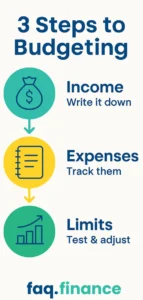Imagine This…
It’s the 20th of the month. You check your bank account and — ouch! — Your balance is way lower than you expected. You ask yourself, “Where did all my money go?”
That’s where a budget comes in. It’s not about cutting out lattes or banning Netflix. It’s about having a plan that gives every dollar a purpose — so you never have to wonder where your money went again.
🔎 What Exactly is a Budget?
A budget is simply a spending plan for your money. It tracks what you earn, what you spend, and what’s left over for savings or debt payoff.
👉 Think of it as your Google Maps for money: without it, you’re driving blind. With it, you know exactly where your money should take you.
A budget isn’t about restriction. It’s about freedom — freedom to spend on what matters most.
🎯 Why Should You Care About Budgeting?
- Control – No more “mystery paycheck disappearances.”
- Clarity – Cover essentials first, then spend guilt-free.
- Progress – Save for emergencies, crush debt, or plan that dream vacation.
💡 Fact: Nearly 60% of Americans don’t track their spending. That’s why so many live paycheck to paycheck. You don’t have to.
🧩 The 3 Core Pieces of Any Budget
- Income – Your salary, side hustles, freelance gigs.
- Expenses – Rent, bills, food, fun money.
- Goals – Savings, debt payoff, investments.
👉 Without goals, a budget is just numbers. With goals, it becomes your wealth-building tool.
🛠️ How to Start Budgeting Today (3 Easy Steps)
Step 1: Write Down Your Income
Know exactly how much you bring home after taxes.
Step 2: Track Your Spending
Use apps like Mint, YNAB, or even a notebook. Start with just 3 categories this week: Rent, Food, Savings.
Step 3: Assign Limits & Test
Set percentages for each category. Try it for 30 days. Adjust if needed.
Pro Tip: Don’t aim for perfection on Day 1. Aim to learn where your money goes.
📝 Quick Quiz: Are You Money-Smart Yet?
Answer these in your head (or in comments):
- Do you know exactly how much you spent last month?
- ✅ Yes / ❌ No
- Do you save at least 20% of your income?
- ✅ Yes / ❌ No
- Do you feel confident paying all your bills on time?
- ✅ Yes / ❌ No
👉 If you said “No” twice or more — this guide is your new best friend.

❌ Common Budgeting Mistakes to Avoid
- Being too strict (you’ll quit by Week 2).
- Ignoring irregular expenses (car repairs, holidays).
- Waiting to save “until I earn more.”
Take Small steps
Even saving $20 this month builds the habit.
Small steps > waiting for the “perfect” paycheck.
📱 Tools to Try (Pick One, Not All)
- Mint (Free): Tracks spending automatically.
- YNAB (Paid): Best for zero-based budgeting fans.
- GoodBudget: Digital envelope system.
- Google Sheets/Notebook: Simple, effective, old-school.
👉 The best budget tool is the one you’ll actually use.
💬 Reader Check-In
❓ What’s your biggest struggle with budgeting — starting, sticking, or overspending?
👉 Share in the comments below. You’re not alone — and someone else probably has the same challenge.
🏁 Next Steps (Your Action Plan)
- Write down your monthly income tonight.
- Track spending for 7 days (use paper or app).
- Set a simple rule (like 50/30/20) and test it this month.
💡 Remember: Budgeting isn’t about getting it perfect. It’s about getting it started.
🎁 Freebie
Want help starting faster?
👉 Download our Budget Starter Worksheet — a one-page template to set up your first budget in 15 minutes.

